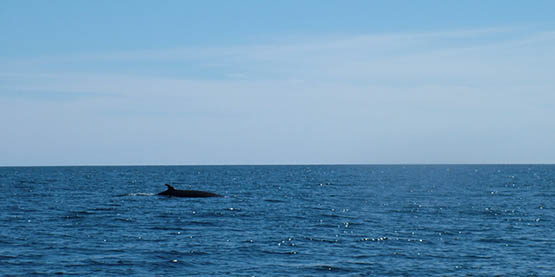Displaying items by tag: sea grass
Aerial Whale Survey off Kerry Coast, Seagrass at Courtmacsheery
It seems to me that, without dedicated volunteers, there would be a lot of work not done in the marine sphere, so I like when possible, to highlight what dedicated people are doing. Publicity can help them to raise funding they need by drawing public attention to what they ae doing and achieving support. So in the current edition of THIS ISLAND NATION, the Whale and Dolphin Group takes us on an aerial survey over the Kerry coast as they survey whales in Irish waters.

Minke Whale Pictured Off Seven Heads Photo by Oisin Macsweeney
Years ago we would never have thought that whales would be seen off Ireland, but it has happened and this Summer when sailing along the West Cork coastline off the Seven Heads two minke whales came within a few hundred yards of my Sigma 33, Scribbler II. My 11-year-old grandson, Oisin, was quickest to fetch a camera from the saloon and get a picture. The excitement of seeing whales so close was huge for him, his younger brother of 9 years, Rowan, even their experienced seafarer father, Cormac and myself. The sight of whales, which followed on dolphins playing around the boat for a while, was a reminder of how the sea has many aspects and that protecting it and its inhabitants is a responsibility on all of us. Later in the week’s cruise, for which we were blessed with one of the best weeks of the season, the sight of plastic debris floating along and sea grass despoiling the lovely village environs of Courtmacsherry, was another reminder – of how humans are damaging the marine environment.
Also in the programme this week we hear about the plans by Waterways Ireland for the years ahead and the valuable marine reserve asset which Bull Island in Dublin Bay is for the capital city. What is impressive about what is happening there, in my view, is the joint community and public authority efforts to protect it, about which Dublin Council tells us, outlining what combined, joint effort at this level through communities can achieve.
And I hope you’ll get a smile from the tale which Valentia Island native, Dick Robinson, tells us about going to school every day to the mainland, journeying across the bay on the island ferries and how there was learning, not only at school but also aboard and what it taught youngsters about the benefits, believe it or not, of storms hitting the island.
“We were invited into schools in the North Wall and while all the children had grandparents who were dockers, not one of them knew what a docker was, because all of that tradition is gone….”
Amidst the current controversy over where Dublin Port and Dun Laoghaire Harbour will dump what they intend to dredge up in their plans to provide deeper access channels for the larger cruise ships which they both covet and which business they are fighting for, that comment, made to me on the edge of Dublin Bay by a man dedicated to preserving the maritime traditions of the port, should give cause for thought about where all the commercial development has taken the communities which once bounded in Dublin Port and lived from the jobs it provided.
Alan Martin of the Dublin Dock Workers’ Preservation Society was speaking to me, as we sat on the edge of Dublin Bay, for the current edition of my maritime programme, THIS ISLAND NATION. We could hear the sound of seagulls wheeling in the sky, the rumble of noise emanating from the docks, ships passed in and out, as we talked and he had a reality check for me. He told me that 40,000 jobs have gone from the capital’s port since the time when dock labour sustained viable communities.
“Why do the people of Dublin seem to know so little about the place of the docks in the history of Liffeyside and how their role was once the heart-and-soul of Dublin Port, its shipping and its commerce?”
There are many voluntary organisations doing great work in the marine sphere, without whom much of the maritime culture, history and tradition would be lost. The Dublin Port and Dock Workers’ Preservation Society, set up to preserve the history of Dublin Port, is definitely one such. The interview Alan Martin gave me is revealing. They have encountered many obstacles in their self-imposed task.
He surprised me with his revelations about the extent of the maritime-associated jobs that have been lost and the port-side communities which have suffered in the drive towards modernity. He made strong points about how Dublin’s marine traditions can be preserved and turned into a modern, vibrant, beneficial culture for the benefit of the city.
This offers a bridge from the past to the future, effectively a conveyance of pride in past experience to benefit modern life. Other port communities could, with benefit, replicate the commitment of the Dublin Dock Workers’ Preservation Society.
It was an interview I enjoyed doing and I think you will enjoy listening to. I am fortunate to work as a marine journalist and to meet exceptional people in the ports and maritime communities. So it is good to report in this programme, a positive attitude amongst young people in coastal areas, many of whom are joining the lifeboat service. Also featured in this edition of the programme is the delight of a coastal town when it gets a new lifeboat, as I found in Youghal in East Cork.
And there is always something interesting and unusual about the sea to report, such as the 467 million years old sea scorpion found in a river in Iowa in the USA.
Listen to the programme by clicking at the top of the page





























































